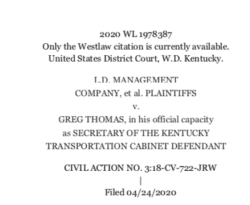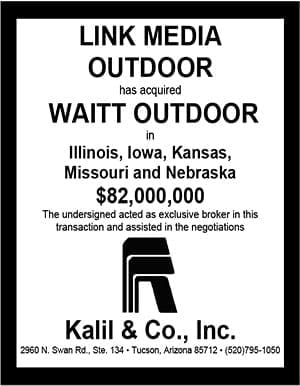
Another State has found itself in the same predicament as Tennessee and Texas, after a Federal Court’s ruling that the Kentucky Highway Beautification Act is unconstitutional. Specifically, on April 24, 2020, the United States District Court for the Western District of Kentucky, issued its opinion in L.D. Management Company vs. Kentucky Transportation Cabinet, succulently holding “the billboard for Lion’s Den may remain where it stands. The Kentucky Billboard Act is unconstitutional in its entirety.”
Billboard Insider and I have written often on the legacy after the U.S. Supreme Court’s seminal decision in 2015 in Reed vs Town of Gilbert (see Rothfelder on Reed Auspro and Thomas). As widely reported, Reed has been applied in the State and Federal Courts, such as in Auspro Enterprises vs Texas Department of Transportation and Thomas vs Bright, as finding the distinction between exempt on-premise and regulated off-premise signs in State Highway Beautification Acts to be content-based regulations in violation of the First Amendment Free Speech Clause.
That trend continues in L.D. Management vs. Kentucky, in which a “gentlemen’s club” maintained a sign adjacent to I-65 that read: “Lion’s Den Adult Superstore Exit Now.” Kentucky ordered removal of the sign under its HBA, contending it was an unpermitted off-premise sign in violation of several provisions in the Act. As the Court noted, however, “none of these requirements would apply if Lion’s Den’s billboard referred to activities on the land where the billboard sits,” thereby finding “Kentucky’s regulations … content-based restrictions on speech.” The Court went on to grant a summary judgment motion against Kentucky, and an injunction against enforcement of its Act.
 The Court relied heavily on the Sixth Circuit Court of Appeals decision in Thomas vs Bright. Indeed, the Court noted “at issue in Thomas was a Tennessee Billboard Act ‘identical’ to Kentucky’s Billboard Act. Applying Reed, the Sixth Circuit found that Tennessee’s ‘on-premise exception scheme is a content-based regulation of (restriction on) free speech.’” The Court also quoted Thomas in calling the dispute “neither a close call nor a difficult decision,” which becomes even more apparent by a couple differences in this case compared to Thomas, Auspro, and Reed.
The Court relied heavily on the Sixth Circuit Court of Appeals decision in Thomas vs Bright. Indeed, the Court noted “at issue in Thomas was a Tennessee Billboard Act ‘identical’ to Kentucky’s Billboard Act. Applying Reed, the Sixth Circuit found that Tennessee’s ‘on-premise exception scheme is a content-based regulation of (restriction on) free speech.’” The Court also quoted Thomas in calling the dispute “neither a close call nor a difficult decision,” which becomes even more apparent by a couple differences in this case compared to Thomas, Auspro, and Reed.
First, the messages displayed on the signs in the Reed, Thomas, and Aupro cases were noncommercial, namely religious and political. By contrast, the sign in L.D. Management directed the traveling public to the Lion’s Den Adult Superstore at the next exit off the highway, and as such, contained a commercial message. The Court observed that “the First Amendment still subjects regulations of commercial speech to ‘heighten judicial scrutiny,’” and held the Kentucky Act unconstitutional under both strict and intermediate scrutiny analysis.
Second, the Court noted that Kentucky had likely selectively policed the sign for the Lion’s Den, and ignored other billboards with less controversial advertisements that may have been in alleged violation of the same rules. Thus, the Court considered Kentucky’s enforcement activities “viewpoint discrimination,” which it described as “an even more ‘egregious’ violation of the First Amendment.’”
Texas “cured” the constitutional defects in its HBA by amending the legislation to eliminate the content-based distinctions between on-premise and off-premise signs. The Tennessee Legislature is considering the same remedy, with its House already passing a content-neutral bill, and its Senate currently reviewing it. Look for Kentucky to follow this trend as well.
[wpforms id=”9787″]
Paid Advertisement

















